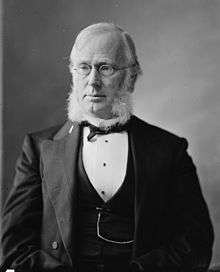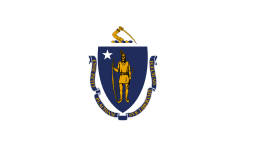George Frisbie Hoar
| George Frisbie Hoar | |
|---|---|
 | |
| United States Senator from Massachusetts | |
|
In office March 4, 1877 – September 30, 1904 | |
| Preceded by | George S. Boutwell |
| Succeeded by | Winthrop M. Crane |
| Member of the U.S. House of Representatives from Massachusetts's 9th district | |
|
In office March 4, 1873 – March 3, 1877 | |
| Preceded by | Alvah Crocker |
| Succeeded by | William W. Rice |
| Member of the U.S. House of Representatives from Massachusetts's 8th district | |
|
In office March 4, 1869 – March 3, 1873 | |
| Preceded by | John Denison Baldwin |
| Succeeded by | John M. S. Williams |
| Member of the Massachusetts Senate | |
|
In office 1857 | |
| Member of the Massachusetts House of Representatives | |
|
In office 1852 | |
| Personal details | |
| Born |
August 29, 1826 Concord, Massachusetts, U.S. |
| Died |
September 30, 1904 (aged 78) Worcester, Massachusetts, U.S. |
| Nationality | American |
| Political party | Republican |
| Alma mater | Harvard University |
| Profession | Law |
| Signature |
|
George Frisbie Hoar (August 29, 1826 – September 30, 1904) was a prominent American politician and United States Senator from Massachusetts. Hoar was born in Concord, Massachusetts. He was a member of an extended family that was politically prominent in 18th and 19th century New England.
Political and legal career
Hoar graduated from Harvard University in 1846, then studied at Harvard Law School and settled in Worcester, Massachusetts where he practiced law before entering politics. Initially a member of the Free Soil Party, he joined the Republican Party shortly after its founding, and was elected to the Massachusetts House of Representatives (1852), and the Massachusetts Senate (1857).
In 1865, Hoar was one of the founders of the Worcester County Free Institute of Industrial Science, now the Worcester Polytechnic Institute. He represented Massachusetts as a member of the U.S. House of Representatives from 1869 through 1877, then served in the U.S. Senate until his death. He was a Republican, who generally avoided party partisanship and did not hesitate to criticize other members of his party whose actions or policies he believed were in error.
Hoar was long noted as a fighter against political corruption, and campaigned for the rights of African Americans and Native Americans. He argued in the Senate in favor of Women's suffrage as early as 1886. He opposed the Chinese Exclusion Act of 1882, describing it as "nothing less than the legalization of racial discrimination."[1] However, he also believed that Portuguese and Italian immigrants were unfit for U.S. citizenship.[2] As a member of the Congressional Electoral Commission, he was involved with settling the highly disputed U.S. presidential election, 1876. He authored the Presidential Succession Act of 1886, and in 1888 he was chairman of the 1888 Republican National Convention.
Unlike many of his Senate colleagues, Hoar was not a strong advocate for an American intervention into Cuba in the late 1890s. After the Spanish–American War, Hoar became one of the Senate's most outspoken opponents of the imperialism of the William McKinley administration. He called for independence for the Philippines, and denounced the Philippine–American War in the following terms:[3]

You have sacrificed nearly ten thousand American lives—the flower of our youth. You have devastated provinces. You have slain uncounted thousands of the people you desire to benefit. You have established reconcentration camps. Your generals are coming home from their harvest bringing sheaves with them, in the shape of other thousands of sick and wounded and insane to drag out miserable lives, wrecked in body and mind. You make the American flag in the eyes of a numerous people the emblem of sacrilege in Christian churches, and of the burning of human dwellings, and of the horror of the water torture. Your practical statesmanship which disdains to take George Washington and Abraham Lincoln or the soldiers of the Revolution or of the Civil War as models, has looked in some cases to Spain for your example. I believe—nay, I know—that in general our officers and soldiers are humane. But in some cases they have carried on your warfare with a mixture of American ingenuity and Castilian cruelty.Your practical statesmanship has succeeded in converting a people who three years ago were ready to kiss the hem of the garment of the American and to welcome him as a liberator, who thronged after your men when they landed on those islands with benediction and gratitude, into sullen and irreconcilable enemies, possessed of a hatred which centuries can not eradicate.
— George Frisbie Hoar, May 1902 speech to the United States Senate
Hoar pushed for and served on the Lodge Committee investigating alleged, and later confirmed, war crimes in the Philippine–American War. He also denounced the U.S. intervention in Panama.
In addition to his political career, Hoar was active in the American Historical Association and the American Antiquarian Society, serving terms as president of both organizations. He was elected a member of the American Antiquarian Society in 1853,[4] and served as vice-president from 1878 to 1884, and then served as president from 1884 to 1887.[5] He was a regent of the Smithsonian Institution in 1880, and a trustee of the Peabody Museum of Archaeology and Ethnology. Through his efforts, the lost manuscript of William Bradford's Of Plymouth Plantation (1620–47), an important founding document of the United States, was returned to New England, after being discovered in Fulham Palace, London, in 1855.
Hoar was elected a Fellow of the American Academy of Arts and Sciences in 1901.[6] His autobiography, Autobiography of Seventy Years, was published in 1903; it first appeared in serial form in Scribner's magazine. Hoar enjoyed good health until June 1904. He died in Worcester, and was buried in Sleepy Hollow Cemetery, Concord. After his death, a statue of him was erected in front of Worcester's city hall, paid for by public donations.
Hoar family and relations
Through his mother, Sarah Sherman, G.F. Hoar was a grandson of prominent political figure, Roger Sherman and Sherman's second wife, Rebecca Minot Prescott. Roger Sherman signed the Articles of Confederation, United States Declaration of Independence and the United States Constitution.
- G.F. Hoar's father, Samuel Hoar, was a prominent lawyer who served on the Massachusetts state senate and the United States House of Representatives.
- G.F. Hoar's brother Ebenezer Rockwood Hoar was an Associate Justice of the Massachusetts Supreme Judicial Court, one of Ulysses S. Grant's Attorneys General, and a nominee to the U.S. Supreme Court.
- G.F. Hoar's first cousin Roger Sherman Baldwin was Governor of Connecticut and a U.S. Senator.
- Another of G.F. Hoar's first cousins, William Maxwell Evarts was US Secretary of State, U.S. Attorney General and a U.S. Senator.
See also
Notes
- ↑ Daniels, Roger (2002). Coming to America: A History of Immigration and Ethnicity in American Life. Harper Perennial. p. 271. ISBN 978-0060505776.
- ↑ Puleo, Stephen (2007). The Boston Italians. Boston: Beacon Press. p. 27. ISBN 9780807050361. See also: George A. Scigliano
- ↑ Hoar, George Frisbie (1906). "Subjugation of the Philippines Iniquitous". In William Jennings Bryan. The World's Famous Orations:America: III (1861–1905). X. Francis W. Halsey, associate editor (On-line edition published March 2003 by Bartleby.com ed.). New York: Funk and Wagnalls.
- ↑ American Antiquarian Society Members Directory
- ↑ Dunbar, B. (1987). Members and Officers of the American Antiquarian Society. Worcester: American Antiquarian Society.
- ↑ "Book of Members, 1780–2010: Chapter B" (PDF). American Academy of Arts and Sciences. Retrieved September 11, 2016.
References
- United States Congress. "George Frisbie Hoar (id: H000654)". Biographical Directory of the United States Congress..
- Hoar, George F. Autobiography of Seventy Years. 2 vols., New York: Scribner’s Sons, 1903.
- Welch, Richard E., Jr. George Frisbie Hoar and the Half-Breed Republicans. Cambridge: Harvard University Press, 1971.
- Sherman Genealogy Including Families of Essex, Suffolk and Norfolk, England By Thomas Townsend Sherman
- Hoar-Baldwin-Foster-Sherman family of Massachusetts at Political Graveyard
External links
| Wikiquote has quotations related to: George Frisbie Hoar |
| Wikimedia Commons has media related to George Frisbie Hoar. |
| Wikisource has the text of a 1892 Appletons' Cyclopædia of American Biography article about George Frisbie Hoar. |
- Works by George Frisbie Hoar at Project Gutenberg
- Works by or about George Frisbie Hoar at Internet Archive
| United States House of Representatives | ||
|---|---|---|
| Preceded by John D. Baldwin |
Member of the U.S. House of Representatives from Massachusetts's 8th congressional district 1869–1873 |
Succeeded by John M. S. Williams (district moved) |
| Preceded by Alvah Crocker (district moved) |
Member of the U.S. House of Representatives from Massachusetts's 9th congressional district 1873–1877 |
Succeeded by William W. Rice |
| United States Senate | ||
| Preceded by George S. Boutwell |
U.S. Senator (Class 2) from Massachusetts 1877–1904 Served alongside: Henry L. Dawes and Henry Cabot Lodge |
Succeeded by Winthrop M. Crane |


